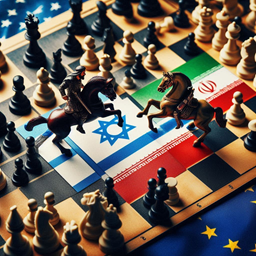By Ron Raskin

A year ago, on October 7th at 6:29 AM, Hamas launched its brutal attack on Israel. Since then, while its military capabilities have been destroyed, Hamas still governs Gaza, hostages remain in captivity, Hezbollah’s war machine has been significantly damaged, Israel faces accusations of genocide, and the West has distanced itself from Israel.
But why is the West so angry with Israel? First let’s divide the reasons behind public opinion and the policies of Western governments and focus on the later. All Western countries agree that Iran and its proxies are the “bad guys” in this game of the century, just like Israel does. But the difference comes from the question of how to deal with these “bad guys”. Consider the following approaches:
- The first approach is to fight to destroy and eliminate the enemy. This was the strategy the West attempted in Iraq and Afghanistan, and it’s the approach Israel is taking with Hamas. However, the likelihood of success is low, as Western values impose limits on their actions, creating an asymmetry in the conflict that makes Iran’s proxies nearly impossible to fully defeat. At the same time, the cost of achieving such a victory is enormous.
- The second approach is to strike hard with the goal of dismantling key military capabilities. Hamas and Hezbollah have already been dealt significant blows. However, this doesn’t necessarily solve the issue; it often just delays it and potentially makes it worse. The affected population, who are often indoctrinated, may grow even more resentful. More than 40,000 Palestinians have died, including many women and children. Regardless of the reasons or whether others could have caused fewer civilian casualties or not, Palestinians will carry this trauma for generations, fueling their hostility toward Israel. In the long run, groups like Hamas don’t lose much—they suffer mainly in the short term.
- The third approach is to fight with the aim of deterrence, which Israel has attempted over the past few decades. However, after the events of October 7th, it became evident that deterrence is ineffective against those who are so deeply brainwashed that they resemble zombies—willing to attack and die out of total insanity or a belief that this is the most honorable path, depending on one’s perspective.
- The fourth approach is to do as little as possible, which is the strategy the U.S. and Europe have taken with Iran and its proxies. This approach stems from their experience with the USSR, which collapsed from within as its people lost faith in Soviet propaganda about the Western threat. They eventually couldn’t grasp what they were fighting against and chose a different path, at least for a decade or so. While this is generally a sound strategy, it has one drawback—it takes many years for any real change to occur, and it relies on your adversary remaining deterred in the meantime.
In recent decades, Israel has largely followed the “do as little as possible” approach, switching to a “fight to deter” strategy when necessary—a policy I refer to as the “Punching Bag” approach. This typically stops just short of the “fight to hit hard” phase, which is often labeled in political terms as Israel’s “disproportionate response” or, more recently, “genocide.” However, as mentioned earlier, this strategy only works if you can actually deter your adversary. When the opposite occurs, Israel finds itself in real and immediate danger—not necessarily from military defeat, but from the fear that its people might break under pressure from surrounding threats. For Israel, this reality ended on October 7th. But for the West, it’s a different story. The West, being significantly more powerful and geographically distant, faces little immediate threat from Iran and its proxies, at least for the next decade or two, and thus has no compelling reason to abandon its current policy.
This brings us to the dilemma: On one hand, the West is attempting to distance itself from Israel and prevent it from escalating to the “fight to hit hard” approach or ” fight to destroy” approach in order to preserve a favorable perception among the people of Iran and its proxies toward the West. Ironically, this leaves Israel isolated, less confident, and more inclined to consider drastic actions.
On the other hand, the West can’t afford to let Israel fall, as that would undoubtedly fuel a massive wave of Islamic fundamentalism that could quickly escalate into a destructive tsunami. The result is a peculiar stance from the West toward Israel: publicly condemning it, yet allowing it to continue fighting—essentially playing a forced version “good cop, bad cop” game.
In late September 2024, Israel managed to partially break the ring of fire, but the question remains: what comes next? Will we witness a truce agreement and some period of calm or will Iran and its proxies hold on and push for the next phase? While the “hit hard” approach may not be enough to deal with Hamas, is it possible for Israel to apply this strategy effectively against Iran itself?
To be continued …

